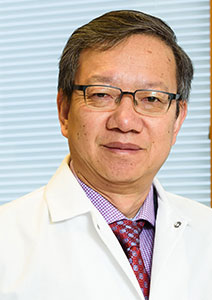Case Western Reserve University researcher Zheng-Rong Lu has been elected as a fellow of The National Academy of Inventors (NAI). The honor highlights the overall career and impact an inventor has had in their field and society as a whole.
Lu is the M. Frank Rudy and Margaret Domiter Rudy Professor of Biomedical Engineering at the Case School of Engineering. He is also a member of the Case Center for Imaging Research at the School of Medicine.
He joins a 2021 class of 164 academic innovators from 116 research universities and governmental and non-profit research institutes worldwide. Further, they collectively hold more than 4,800 patents issued by the United States Patent and Trademark Office (USPTO).
Cancer detection and gene therapy

Lu’s research has focused on two areas. One is early cancer detection with tumor-detecting contrast agents. The second is the novel delivery of gene therapy into the body, especially the eye. The latter has been used as as a way to combat the rare but debilitating Stargardt disease.
Stargardt is a rare, but irreversible, genetic disorder which often surfaces during childhood or adolescence. While people with the disorder rarely go completely blind, they progressively lose vision in both eyes. Further, they also may become very sensitive to light and, in some cases, develop color blindness.
His cancer-detection research accelerated this year. The U.S. Food and Drug Administration approved human clinical trials to test the safety of a prostate cancer-detection technology developed by Lu and licensed to the company he founded, Molecular Theranostics LLC, and partners U.S. Motek LLC and Jiangsu Motek Pharmaceuticals Ltd. of China.
Lu’s most recent gene therapy work showed that by using chemically modified lipids, Stargardt disease didn’t return in animal models for at least a year after treatment.
Lu said he felt fortunate to receive the award and thanked his colleagues—both for frequent collaboration and for nominating him.
“This isn’t something I expected,” he said. “But it means that our work in this lab is appreciated and that we are making a difference. This prestigious recognition means that we are among the innovators who are trying to discover new things in everything from the economy to medicine.”
Venkataramanan “Ragu” Balakrishnan, the Charles H. Phipps Dean of the Case School of Engineering, said Lu’s election to the academy was a “clear demonstration of the quality of his research and the potential for that research to have a transformative effect on medical imaging and drug delivery.
“Technologies created in professor Lu’s labs have the potential to profoundly improve cancer imaging and diagnosis, ultimately leading to improved health outcomes from those affected,” Balakrishnan said.
Lu said there is also a personal side to his research, especially with Stargardt.
“I get emails every week, most often from people who are desperately looking for some hope, some news about what we are finding and when there will be clinical trials,” he said. “This reminds me that our work has real meaning, not just to write papers and do more research, but to really help people.”
NAI fellows and senior members
The NAI Fellows Program recognizes academic inventors who have “demonstrated a prolific spirit of innovation in creating or facilitating outstanding inventions that have made a tangible impact on quality of life, economic development and the welfare of society,” according to the academy.
NAI Senior Members are active faculty, scientists and administrators who have demonstrated “remarkable innovation producing technologies that have brought, or aspire to bring, real impact on the welfare of society.”
This latest class of NAI fellows includes 33 members of the National Academies of Sciences, Engineering, and Medicine, and three Nobel Laureates, as well as other honors and distinctions.
The NAI said this year’s class also reflected its “dedicated efforts to promote diversity and inclusion in its membership,” with the addition of three outstanding academic female Black inventors.
The 2021 fellows will be honored at the Fellows Induction Ceremony during NAI’s 11th Annual Meeting in June 2022 in Phoenix.
The complete list of NAI Fellows is available on its website.
The NAI and CWRU
Lu joins many other Case Western Reserve faculty who have been elected as fellows or senior members by the NAI in recent years. Among the past recipients affiliated with CWRU are:
- Rohan Akolkar, the Milton and Tamar Maltz Professor of Energy Innovation and Ohio Eminent Scholar in Advanced Energy Research in the Case School of Engineering—senior member in February, 2021.
- Scott Bruder, an adjunct professor of biomedical engineering. Bruder had previously served on the School of Medicine’s faculty for 13 years; and Anant Madabhushi, the Donnell Institute Professor of Biomedical Engineering and director of the Center for Computational Imaging and Personalized Diagnostics at Case Western Reserve—both fellows in 2020.
- Umut Gurkan, the Warren E. Rupp Associate Professor of Mechanical and Aerospace Engineering at the Case School of Engineering—senior member in August 2020.
- School of Medicine Dean Stanton L. Gerson. He was also acting director of the Case Comprehensive Cancer Center (Case CCC)—senior member in 2019.
- Pamela B. Davis, dean emerita of the School of Medicine—fellow in 2019.
- Mark A. Griswold, a professor in the Department of Radiology at School of Medicine and faculty director of the Interactive Commons (IC); fellow in 2017.
- John Nottingham, an advisor to the university, trustee of Cleveland Clinic and co-president of Nottingham Spirk, —fellow in 2017.
- Then-Case School of Engineering Dean Jeffrey Duerk; and Francis Papay, then a professor of surgery in Cleveland Clinic’s Lerner College of Medicine at Case Western Reserve; both fellows in 2016.
- Trevor Jones, then on the President’s Visiting Committee. He was also chair of the university’s Research and Technology Commercialization Visiting Committee; fellow in 2014.
- Robert H. Miller, then-professor of neurosciences and the university’s vice president for research; and P. Hunter Peckham, the Donnell Institute Professor of biomedical engineering and orthopedics and founder of the Cleveland Functional Electrical Stimulation Center; both fellows in 2013.
For more information, contact Mike Scott at mike.scott@case.edu.
This article was originally published Dec. 14, 2021.

